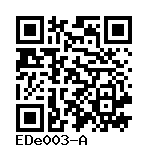RH 4
EDe003-A
General
Cell Line |
|
| hPSCreg name | EDe003-A |
| Cite as: | EDe003-A (RRID:CVCL_C357) |
| Alternative name(s) |
RH 4
|
| Cell line type | Human embryonic stem cell (hESC) |
| Similar lines | No similar lines found. |
| Last update | 4th September 2022 |
| User feedback | |
Provider |
|
| Generator | University of Edinburgh (ED) |
| Derivation country | United Kingdom |
External Databases |
|
| Cellosaurus | CVCL_C357 |
| Wikidata | Q54950345 |
General Information |
|
| Publications | |
| * Is the cell line readily obtainable for third parties? |
Yes |
Donor Information
General Donor Information |
|
| Sex | male |
Phenotype and Disease related information (Donor) |
|
| Diseases | |
Ethics
| Was the embryo established purely for research purposes? | No |
| Have both parents consented to the use of the embryo for ESC derivation? | Yes |
| Has informed consent been obtained from the donor of the embryo/tissue from which the pluripotent stem cells have been derived? | Yes |
| Alternatives to consent are available? | Yes |
| Alternatives to consent | |
| Alternative consent approval number | |
| Please indicate whether the data associated with the donated material has been pseudonymised or anonymised. | anonymised |
| Does consent explicitly allow the derivation of pluripotent stem cells? | Yes |
| * Does consent expressly prevent the derivation of pluripotent stem cells? | No |
| How may genetic information associated with the cell line be accessed? | |
| Will the donor expect to receive financial benefit, beyond reasonable expenses, in return for donating the biosample? | No |
| Has a favourable opinion been obtained from a research ethics committee, or other ethics review panel, in relation to the Research Protocol including the consent provisions? | Yes |
| Name of accrediting authority involved? | HEFA |
| Approval number | R0136 |
hESC Derivation
| Supernumerary embryos from IVF treatment? |
Yes
|
| PGD Embryo? |
No |
Culture Conditions
| Surface coating | Gelatin | ||||||
| CO2 Concentration | 5 % | ||||||
| Medium |
Other medium:
Base medium: Knockout-DMEM
Main protein source: Fetal bovine serum Serum concentration: 20 % Supplements
|
Characterisation
Analysis of Undifferentiated Cells
| Marker | Expressed | Immunostaining | RT-PCR | Flow Cytometry | Enzymatic Assay | Expression Profiles |
| Alkaline Phosphatase |
Yes |
|
||||
| POU5F1 (OCT-4) |
Yes |
|
||||
| SSEA-4 |
Yes |
|
|
|||
| TRA 1-81 |
Yes |
|
|
|||
| TRA 1-60 |
Yes |
|
Differentiation Potency
Genotyping
Karyotyping (Cell Line) |
|
| Has the cell line karyotype been analysed? |
Yes
46XY
Passage number: 33
|
Other Genotyping (Cell Line) |
|


Login to share your feedback, experiences or results with the research community.